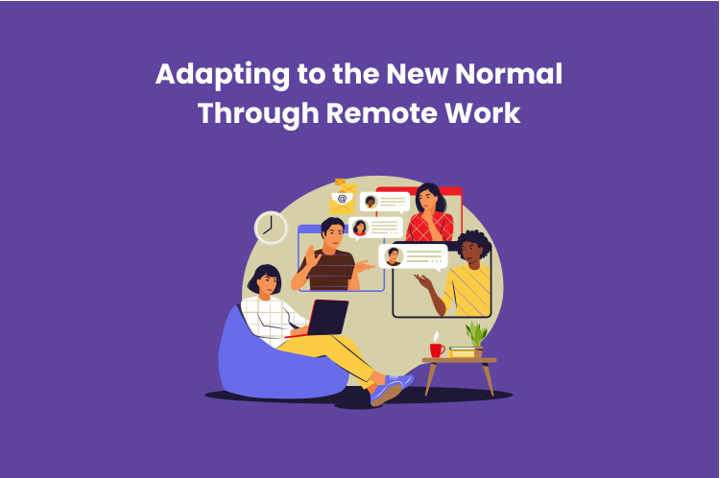The COVID-19 pandemic, acting as a catalyst, expedited shift, compelling businesses and individuals to swiftly adapt. As we navigate this dynamic landscape, the ability to adapt to the new normal is crucial for both organizations and their employees. This blog delves into the remote work revolution and its profound impacts while shedding light on how individuals and businesses can effectively embrace change. Furthermore, we will explore the pivotal role of HR Digital Transformation and the significance of enrolling in a Digital Transformation Course in the current climate.
Table of Contents
- The Remote Work Revolution
- Adapting as an Employee
- Adapting as an Organization
- The Role of HR Digital Transformation
- Enrolling in a Digital Transformation Course
- Conclusion
The Remote Work Revolution
Once thought to be an exception, remote work has quickly become the norm in today’s business. This transformation had already been made possible by advances in technology, particularly the widespread availability of high-speed internet and sophisticated collaboration tools. However, the COVID-19 epidemic served as a catalyst, requiring the quick implementation of remote work guidelines to protect both employee welfare and corporate survival.
Since it demonstrates that being physically present in an office is not necessary for productive work, the remote work revolution has put old ideas of productivity to the test. It has brought with it fresh possibilities as well as a unique set of difficulties for people and organisations alike.
Adapting as an Employee
A mentality change and the learning of new skills are essential for employees to succeed in the new normal. The following are essential tactics for succeeding in the remote work era:
- Digital Literacy: A lot of digital tools and technology are used in remote work. Digital literacy is no longer simply a trendy term—it’s a need. This entails being adept at using project management, communication, and video conferencing software.
- Time management: Working remotely often means having more control over your schedule. Time management that works is essential. Keeping organised and responsible may be achieved by using time-tracking applications.
- Communication Skills: Effective communication is essential, given the restricted quantity of face-to-face encounters. To avoid misunderstandings and promote teamwork, communication must be clear and concise both in writing and verbally.
- Self-Motivation: Working remotely may be lonely and requires a lot of self-drive. Success requires establishing objectives, sticking to a schedule, and finding strategies to remain motivated.
- Work-Life Balance: When working remotely, it might be difficult to distinguish between work and personal life. Maintaining a good work-life balance requires frequent breaks and the establishment and maintenance of clear boundaries.
Adapting as an Organization
Adapting to the new normal is equally important for organisations to maintain resilience and competitiveness. The following tactics may assist companies in thriving in the age of remote work:
- All degrees of digital change should be embraced. Invest in cloud computing, project management software, and safe communication tools to facilitate remote work. Enrolling staff members in a “Digital Transformation Course” may greatly improve this process by ensuring they are knowledgeable about the newest digital technologies and tactics.
- Flexible Work Policies: Formulate flexible work policies that empower employees to balance work and personal life effectively. This entails giving employees the choice of working remotely, allowing them flexible scheduling, and supporting their overall well-being.
- Clear Communication: Keep lines of communication open and active with your staff. Use digital platforms to inform staff members about corporate news, guidelines, and expectations.
- Performance measures: Use measures for performance that show results rather than hours done. Give your staff the resources and trust they need to succeed and trust them to produce results.
- Employee Training: Invest in continuous training and upskilling initiatives as part of the HR digital transformation. By providing your employees with the skills they need to succeed in the digital era, a “Digital Transformation Course” may increase the adaptability and competitiveness of your business.
The Role of HR Digital Transformation
Embracing the new normal requires a digital overhaul of HR. HR departments used to be mostly concerned with administrative work, but in the digital age, they are now also involved in talent management, strategic planning, and improving the employee experience.
HR professionals may improve the employee experience overall, make data-driven choices, and expedite their operations by incorporating technology. Digital technologies improve HR services in many ways, from recruiting to onboarding, performance management to training. They make remote hiring and onboarding, real-time feedback, and customised training programmes possible.
Including HR digital transformation may also help with employee retention and engagement. Even in a remote work environment, an HR department that is more tech-savvy and flexible can quickly recognise and respond to employee requirements, creating a feeling of loyalty and belonging.
Enrolling in a Digital Transformation Course
Beyond just upgrading technology, digital transformation entails a fundamental change in how businesses function and compete in the digital world. For both people and organisations, taking a “Digital Transformation Course” may be a life-changing event.
Such training gives people the chance to get the abilities and information required to succeed in a digitally-driven job. These courses provide vital insights and practical experience, whether you are an employee seeking to improve your digital literacy or an HR professional hoping to lead your organisation through a digital transformation.
Putting staff through a “Digital Transformation Course” is an investment in the future for organisations. It guarantees that the people in your organisation are capable of navigating the digital terrain and adjusting to shifting conditions, which enhances overall competitiveness, employee happiness, and productivity.
Conclusion
Remote work is the new normal, and it requires flexibility from both people and organisations. In this changing environment, accepting digital transformation and signing up for a “Digital Transformation Course” stand out as crucial milestones. The people who adapt and prosper will be in the greatest position going forward as the digital era continues to transform the nature of employment.

















